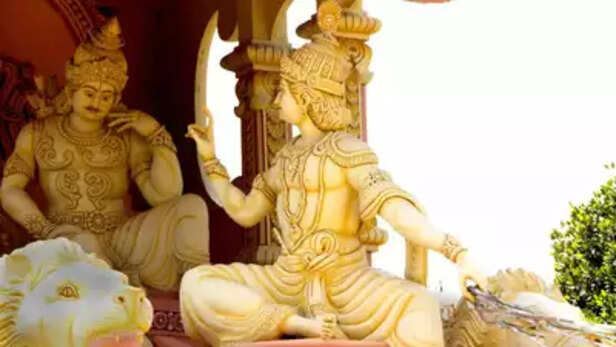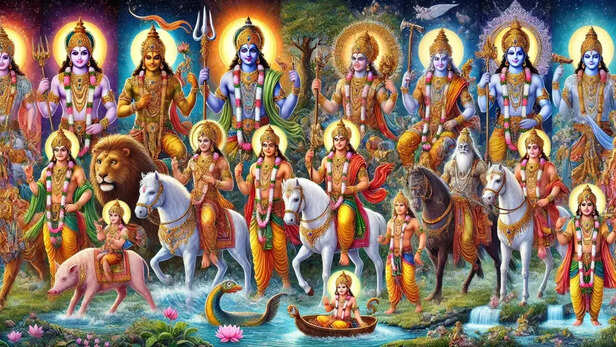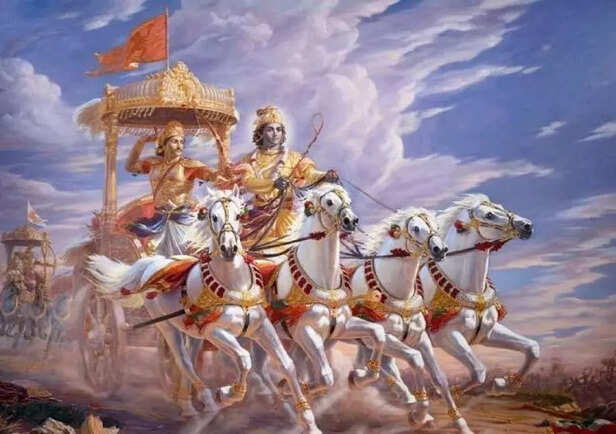He Promised He’d Return When the World Falls—Is That Time Now?
Noopur Kumari | May 12, 2025, 19:00 IST

( Image credit : Times Life Bureau )
What if the chaos around us isn’t just a coincidence, but a call for Krishna’s return? Bhagavad Gita 4.7 holds a timeless promise: whenever darkness rises, divinity descends. This article uncovers the hidden power behind Krishna’s vow, the emotional depth of his return, and how this ancient verse still speaks to our broken world today. Dive in to discover why Gita 4.7 isn’t just scripture—it’s a lifeline for every soul seeking hope.
In the heart of the Bhagavad Gita lies a verse that has echoed through centuries, offering solace during chaos and clarity amidst confusion. Chapter 4, Verse 7 is not just a line of scripture; it's a divine promise, a cosmic assurance that when righteousness falters and darkness prevails, the Divine will manifest to restore balance. But what does this truly mean? Why does Krishna choose to return, and how does this ancient wisdom resonate in our modern lives? Let's delve deep into the hidden truths of this profound verse

“Whenever there is a decline in righteousness and a rise in unrighteousness, O Arjuna, I manifest Myself on earth This profound declaration by Lord Krishna is not just a divine assurance—it's a timeless reminder that the universe is never abandoned in times of crisis. Krishna’s words reflect the eternal rhythm of dharma and adharma. Whenever darkness threatens to overpower light, the Divine doesn't stay silent. He returns—not just as a saviour, but as a force to awaken humanity, restore moral order, and guide souls back to truth. His arrival is a call for transformation, both in the world and within us.

The concept of 'Avatar' finds its roots in this powerful verse of the Gita. An avatar isn't merely a godly form—it is the Divine choosing to take a human shape with a specific purpose. Whether it was Rama, Krishna, or any other incarnation, each descent happens with divine intent, not coincidence. When humanity strays from the path of righteousness, the Divine returns to restore balance. This sacred cycle ensures that dharma—truth, justice, and moral order—never fully disappears, no matter how dark the times may seem. It’s a cosmic promise that whenever evil rises, light will follow. Always.

In today’s chaotic world, marked by moral confusion, rising injustice, environmental collapse, and deep social unrest, the message of Gita 4.7 feels profoundly urgent. Though we may not see Lord Krishna descend with a chariot and conch, his divine promise echoes through time. His essence can awaken in compassionate leaders, brave social movements, or even within the quiet courage of our hearts. Gita 4.7 isn't just a historical verse; it’s a call for each of us to rise, reflect, and restore dharma in our daily lives. The question it asks is timeless: Are we living in alignment with truth and justice?

Beyond its global message, Gita 4.7 holds a deeply personal truth. It’s not just about divine intervention in times of global crisis—it’s about the battles within us. Every individual faces moments when the line between right and wrong blurs, when confusion clouds judgment, and when darkness seems easier than light. In such times, Krishna's message reminds us to awaken our inner dharma. It urges us to recognise and confront the 'adharma' within our anger, fear, greed, or doubt. By turning inward and embracing Krishna's guidance, we take the first powerful step toward clarity, strength, and personal transformation.

Krishna’s promise in the Bhagavad Gita isn’t limited to an era long gone—it’s a timeless assurance that transcends centuries. Whenever injustice prevails, when truth is overshadowed by falsehood, and when humanity feels lost in darkness, Krishna assures us that He will return to restore balance. This verse is not just a line from scripture; it’s a powerful reminder that divine intervention is never far when righteousness is in danger. It speaks to every soul that feels hopeless, reminding us that no matter how broken the world seems, light will rise again. Krishna always returns—when we need Him the most.
Bhagavad Gita 4.7 isn't just a verse — it's a soul-stirring wake-up call. It reminds us that the divine doesn't only descend from the heavens — it also rises from within us when we choose righteousness over comfort. Krishna’s promise, “Whenever there is a decline in dharma, I manifest,” isn’t just about a cosmic avatar returning in some far-off age. It’s about how each of us can embody that divine purpose in our everyday lives. What if Krishna’s return isn’t just an event we wait for, but a transformation we live through? Every time we raise our voice against injustice, protect the weak, or choose truth over easy silence — we become instruments of dharma. Maybe His return is not thunder in the skies, but the quiet courage in our hearts. This verse asks us to look inward, to awaken the Krishna within. In a world riddled with darkness, each small act of goodness becomes a divine act. As we walk the path of truth, compassion, and bravery, we stop being mere observers and become carriers of light. We don’t just wait for Krishna to return — we carry Him back into the world, one righteous step at a time.
Explore the latest trends and tips in Health & Fitness, Travel, Life Hacks, Fashion & Beauty, and Relationships at Times Life!
1. The Verse That Shook the Battlefield

Krishna and Arjuna on the battlefield of Kurukshetra.
( Image credit : Times Life Bureau )
“Whenever there is a decline in righteousness and a rise in unrighteousness, O Arjuna, I manifest Myself on earth This profound declaration by Lord Krishna is not just a divine assurance—it's a timeless reminder that the universe is never abandoned in times of crisis. Krishna’s words reflect the eternal rhythm of dharma and adharma. Whenever darkness threatens to overpower light, the Divine doesn't stay silent. He returns—not just as a saviour, but as a force to awaken humanity, restore moral order, and guide souls back to truth. His arrival is a call for transformation, both in the world and within us.
2. The Avatar: A Divine Descent

various avatars of Lord Vishnu.
( Image credit : Times Life Bureau )
The concept of 'Avatar' finds its roots in this powerful verse of the Gita. An avatar isn't merely a godly form—it is the Divine choosing to take a human shape with a specific purpose. Whether it was Rama, Krishna, or any other incarnation, each descent happens with divine intent, not coincidence. When humanity strays from the path of righteousness, the Divine returns to restore balance. This sacred cycle ensures that dharma—truth, justice, and moral order—never fully disappears, no matter how dark the times may seem. It’s a cosmic promise that whenever evil rises, light will follow. Always.
3. Modern Echoes: Is Krishna Among Us?

Krishna
( Image credit : Times Life Bureau )
In today’s chaotic world, marked by moral confusion, rising injustice, environmental collapse, and deep social unrest, the message of Gita 4.7 feels profoundly urgent. Though we may not see Lord Krishna descend with a chariot and conch, his divine promise echoes through time. His essence can awaken in compassionate leaders, brave social movements, or even within the quiet courage of our hearts. Gita 4.7 isn't just a historical verse; it’s a call for each of us to rise, reflect, and restore dharma in our daily lives. The question it asks is timeless: Are we living in alignment with truth and justice?
4. Personal Dharma: The Inner Battlefield

person meditating
( Image credit : Times Life Bureau )
Beyond its global message, Gita 4.7 holds a deeply personal truth. It’s not just about divine intervention in times of global crisis—it’s about the battles within us. Every individual faces moments when the line between right and wrong blurs, when confusion clouds judgment, and when darkness seems easier than light. In such times, Krishna's message reminds us to awaken our inner dharma. It urges us to recognise and confront the 'adharma' within our anger, fear, greed, or doubt. By turning inward and embracing Krishna's guidance, we take the first powerful step toward clarity, strength, and personal transformation.
5. The Eternal Promise: Hope Amidst Despair

sunrise
( Image credit : Times Life Bureau )
Krishna’s promise in the Bhagavad Gita isn’t limited to an era long gone—it’s a timeless assurance that transcends centuries. Whenever injustice prevails, when truth is overshadowed by falsehood, and when humanity feels lost in darkness, Krishna assures us that He will return to restore balance. This verse is not just a line from scripture; it’s a powerful reminder that divine intervention is never far when righteousness is in danger. It speaks to every soul that feels hopeless, reminding us that no matter how broken the world seems, light will rise again. Krishna always returns—when we need Him the most.
